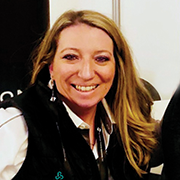 Jamie DelliSanti
Jamie DelliSanti
Senior Strategic Account Executive
www.rubicon.com
Q: WHY IS IT IMPORTANT TO TRACK WASTE DIVERSION ACROSS MULTIPLE LOCATIONS?
Waste diversion tracking across an entire portfolio is essential to capturing ALL data relating to waste programs and diversion rates. Rubicon streamlines this data into one centralized platform that provides customers with a complete view of their entire waste and recycling operation. Providing consolidated data and enhanced visibility into that data is critical, especially for customers such as retail chains with hundreds of locations across the country, as it drives more informed decision-making around waste and recycling programs, which in turn moves the needle toward increased diversion metrics on a large scale.
Additionally, enhanced visibility into waste management at a macro level means increasingly efficient action taken toward diversion across locations. Customers can ensure that all locations are participating in and driving increased diversion levels and identify if certain locations need alternative service offerings to help them meet their diversion goals.
Q: HOW DOES THIS CONTRIBUTE TO ESG OR CORPORATE SUSTAINABILITY GOALS?
Waste diverted from landfills (waste diversion) is a key data point used in reporting on overall ESG goals, specifically for the E (environmental). Organizations with ESG goals—particularly those focused on “The E”—must consider all areas of their business to identify changes that produce measurable results, such as waste diversion and reduction of carbon offsets.
To achieve these goals, alternative waste solutions need to be implemented. These include, for example, traditional recycling methods, organics programs, e-waste, reusing hard-to-recycle items and overall focus on circular economy practices to keep material out of landfills. In a circular economy, products no longer have an end of life. When a material is no longer useful in one system, it doesn’t become waste but rather becomes a valuable input in a separate process. Businesses are fundamental in driving widespread awareness and adoption of such practices.
Q: WHAT IS RUBICON’S VALUE PROPOSITION—WHAT SETS YOU APART FROM OTHER COMPANIES?
At Rubicon, we are on a mission to end waste. Not just physical waste that businesses, government and other organizations produce in their daily operations but wasted time, money and energy. Our work is driven by a commitment to keep waste out of landfills and to create a circular economy through recycling and reuse. We help our partners find economic value in their waste streams and confidently execute on their sustainability goals.
Rubicon focuses on developing software solutions that bring new transparency to the waste and recycling industry—encouraging customers to make data-driven decisions that lead to more efficient and effective operations, as well as more sustainable outcomes. Our RUBICONConnect portal is a one-stop-shop for waste collection transparency, diversion reporting and cost savings.
Additionally, Rubicon does not own garbage trucks, landfills or any other waste collection assets. Instead, Rubicon partners with over 8,000 local and regional waste haulers, which allows us flexibility to make decisions in the best interest of our customers.
In August, Rubicon listed on the New York Stock Exchange (NYSE: RBT). Becoming a publicly traded company is a tremendous step forward for Rubicon that will elevate its platform and products, while accelerating our mission to end waste through the reimagining of the waste and recycling category.
Q: DO YOU HAVE PROGRAMS FOR SMALL AND MIDSIZE CONVENIENCE RETAILERS THAT COULD HELP THEM MOVE TOWARD MORE SUSTAINABLE WASTE-DISPOSAL PRACTICES?
We work with many companies of varying sizes. Rubicon has a Key Account division which supports the larger, multi-site/multi-state portfolios, as well as a Small Business division, which can support smaller portfolios of one or more locations.
We recognize that change must be made at all levels in order to effectively end waste. To this end, Rubicon strives to provide the same quality of service to its small and midsize customers as it would a large retail chain, often at a lower cost than their previous providers, which allows them to allocate these savings into other areas of their business.
Our Key Accounts onboarding process takes approximately 60 days from contract signature to program start date. Small business clients, however, can be launched in as little as five business days.
Q: WHAT IS THE FUTURE OF WASTE TRACKING AND WASTE REDUCTION?
The application of technology in the waste and recycling space will continue to grow with the demand for visibility as it applies to waste tracking and reduction. I believe the increased focus on sustainability will require providers to continually offer alternative solutions to the traditional trash-to-landfill model, placing increased material volume into the circular economy.